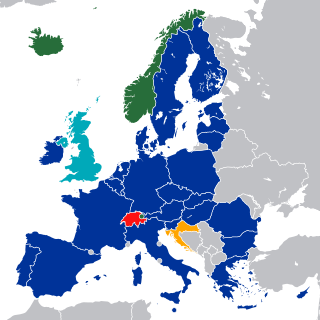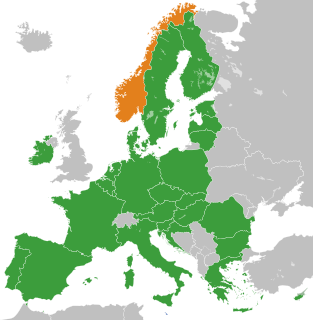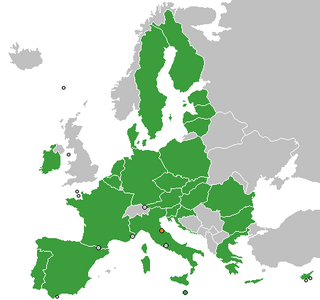Related Research Articles

The European Free Trade Association (EFTA) is a regional trade organization and free trade area consisting of four European states: Iceland, Liechtenstein, Norway, and Switzerland. The organization operates in parallel with the European Union (EU), and all four member states participate in the European Single Market and are part of the Schengen Area. They are not, however, party to the European Union Customs Union.

The European Environment Agency (EEA) is the agency of the European Union (EU) which provides independent information on the environment.

The European Economic Area (EEA) was established via the Agreement on the European Economic Area, an international agreement which enables the extension of the European Union's single market to member states of the European Free Trade Association. The EEA links the EU member states and three EFTA states into an internal market governed by the same basic rules. The United Kingdom benefits from this relationship during the transition/implementation period planned by the treaties. These rules aim to enable free movement of persons, goods, services, and capital within the European Single Market, including the freedom to choose residence in any country within this area. The EEA was established on 1 January 1994 upon entry into force of the EEA Agreement. The contracting parties are the EU, its member states, and Iceland, Liechtenstein, Norway, and the United Kingdom.

A customs union is the principal area of robust formal agreement between the Principality of Andorra and the European Union (EU). Andorra borders two EU member states: France and Spain.
Environmental accounting is a subset of accounting proper, its target being to incorporate both economic and environmental information. It can be conducted at the corporate level or at the level of a national economy through the System of Integrated Environmental and Economic Accounting, a satellite system to the National Accounts of Countries.

Norway is not a member state of the European Union (EU). However, it is associated with the Union through its membership of the European Economic Area (EEA), established in 1994. Norway was a founding member of the European Free Trade Association (EFTA) in 1960, which was originally set up as an alternative to the European Economic Community (EEC), the main predecessor of the EU. Norway had considered joining both the EEC and the European Union, but opted to decline following referendums in 1972 and 1994. According to the European Social Survey conducted in 2018, 73.6% of Norwegians would vote 'No' in a Referendum to join the European Union. Norway has two land borders with EU member states: Finland and Sweden.

Turkey hosts more than three thousand endemic plant species, has high diversity of other taxa, and is almost entirely covered by three of the world's thirty-five biodiversity hotspots. Although some environmental pressures have been decoupled from economic growth the environment still faces many threats, such as coal and diesel fuel emitting greenhouse gases and deadly fine particulate air pollution. As of 2019 there is no fine particulate limit and coal in Turkey is subsidized.
The Transform Drug Policy Foundation (Transform) is a registered non-profit charity based in the United Kingdom working in the field of drug policy and law reform.
William Wallace Kollar is an American football coach and former player who is currently the defensive line coach for the Denver Broncos of the National Football League (NFL). Kollar played as a defensive lineman in the NFL for the Cincinnati Bengals from 1974 to 1976, and the Tampa Bay Buccaneers from 1977 to 1981. Kollar has 34 years of coaching experience, including the last 28 seasons coaching defensive linemen in the NFL. Before coming to Denver in 2015, he coached the defensive line for Houston (2009-14), Buffalo (2006-08), St. Louis (2001-05) and Atlanta (1990-2000).
Environmental pricing reform (EPR) is the process of adjusting market prices to include environmental costs and benefits.

The Republic of Azerbaijan and the European Union (EU) have maintained a positive relationship through the years and have become more closely linked since 1991. Azerbaijan is currently part of the European Neighborhood Policy, Eastern Partnership and the Council of Europe. The EU is the largest foreign grant donor and investor of Azerbaijan, both in the government sector and civil society making available over 600 million EURO of bilateral EU assistance since 1992.
Sustainability measurement is the quantitative basis for the informed management of sustainability. The metrics used for the measurement of sustainability are still evolving: they include indicators, benchmarks, audits, indexes and accounting, as well as assessment, appraisal and other reporting systems. They are applied over a wide range of spatial and temporal scales.

Waste are unwanted or unusable materials. Waste is any substance which is discarded after primary use, or is worthless, defective and of no use. A by-product by contrast is a joint product of relatively minor economic value. A waste product may become a by-product, joint product or resource through an invention that raises a waste product's value above zero.

Relations between the Most Serene Republic of San Marino and the European Union (EU) began in February 1983. San Marino borders one EU member state: Italy.

Relations between the Principality of Monaco and the European Union (EU) are primarily conducted through France. Through that relationship Monaco directly participates in certain EU policies. Monaco is an integral part of the EU customs territory and VAT area, and therefore applies most measures on excise duties and VAT. Monaco borders one EU member state: France. However this relationship does not extend to external trade. Preferential trade agreements between the EU and third countries apply only to goods originating from the customs territory – Monaco may not claim EU origin in this respect.

National identity cards are issued to their citizens by the governments of all European Economic Area (EEA) member states except Denmark, Ireland, Iceland, Norway and the United Kingdom. Citizens holding a national identity card, which states citizenship of an EEA member state or Switzerland, can use it as an identity document within their home country, and as a travel document to exercise the right of free movement in the EEA and Switzerland. However, identity cards that do not state citizenship of an EEA member state or Switzerland, including national identity cards issued to residents who are not citizens, are not valid as travel documents within the EEA and Switzerland.
Visa requirements for European Union citizens are administrative entry restrictions by the authorities of other states placed on citizens of the European Union. They differ among countries. The European Union has achieved full reciprocity with certain countries.
A British Overseas Territories citizen holds British nationality by virtue of a connection with a British Overseas Territory.

Air pollution in Turkey is the most lethal environmental issue in Turkey, with levels across the country above World Heath Organisation guidelines. An estimated 30,000 people die each year from air pollution-related illnesses, about 8% of all deaths. Although there is some monitoring of air pollution compared with other European countries, many air pollution indicators are not available. Regulations in Turkey do not contain any restrictions on the pollutant PM 2.5, which causes lung diseases. Researchers estimate that reducing air pollution to World Health Organization limits would save 7 times the number of lives that were lost in traffic accidents in 2017. As of 2020 Turkey has not ratified the Gothenburg Protocol, although it has ratified the original Convention on Long-Range Transboundary Air Pollution. Short-range pollution can affect neighbouring countries.

Passports of the EFTA member states are passports issued by the European Free Trade Association (EFTA) member states Iceland, Liechtenstein, Norway and Switzerland. EFTA is in this article used as a common name for these countries.
References
- ↑ "defensive expenditure — Environmental Terminology Discovery Service — EEA". Glossary.eea.europa.eu. Retrieved 2014-05-17.
- ↑ "Chapter 13". Appstate.edu. Retrieved 2014-05-17.
- ↑ "Archived copy" (PDF). Archived from the original (PDF) on 2014-05-17. Retrieved 2014-05-16.CS1 maint: archived copy as title (link)
- ↑ "Negative externalities, defensive expenditures and labour supply in an evolutionary context". 2014-05-12. Retrieved 2014-05-17.
| This economic term article is a stub. You can help Wikipedia by expanding it. |